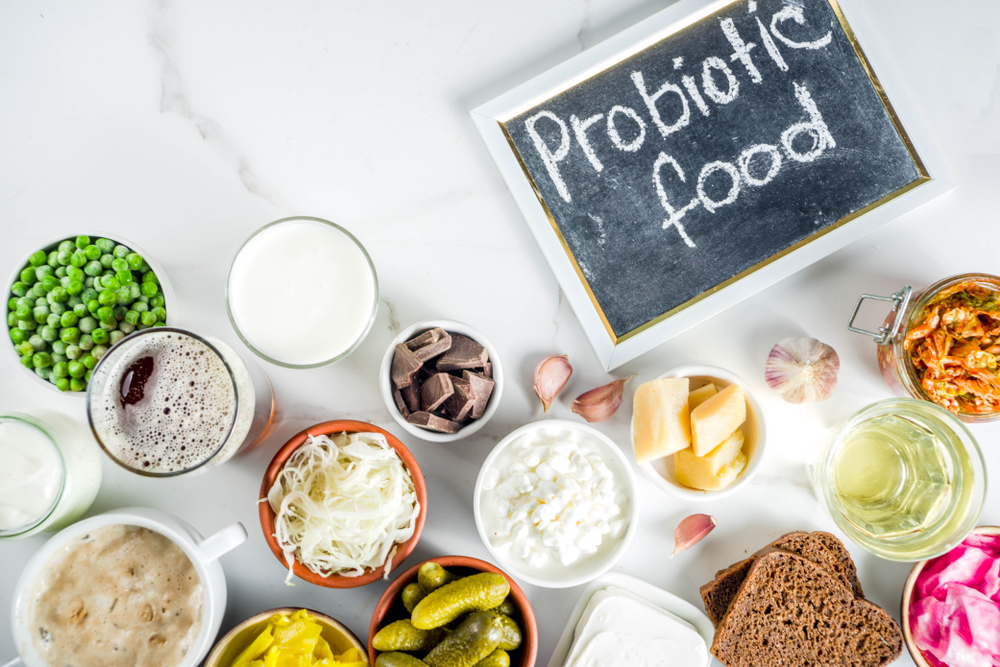Inside your body lives over a trillion bacteria. While that may sound a bit strange at first, these microscopic bacteria help keep us healthy, forming what’s known as our microbiome. Many of these bacteria live and play an active role within our digestive system—stomach and intestines.
So it stands to reason that by boosting gut health, we can improve the overall health of our bodies, especially if our microbiome is so ubiquitous. Wondering how to improve gut health naturally? There are many ways, and many of them start with the right nutrition and support.
Here we’ll explore the critical connection between your gut, your brain, and your body. Here’s how to improve gut health naturally to increase your sense of wellbeing.

Understanding Your Microbiome
When we hear the term microbiome, many of us may wonder what exactly that refers to. Inside our bodies live hundreds of thousands—over a trillion microscopic bacteria. These bacteria live on our skin, inside our bodies, and especially in our digestive tract.
When we consume food, it has many bacteria already living on the surface. It’s not that our food is dirty, contaminated, or unhealthy. Bacteria cover almost everything on earth. There are healthy bacteria and less-healthy bacteria, but they exist everywhere, and many of them are positive contributors to our health. Maintaining balance is key to feeling healthy and having a properly functioning “gut” or digestive system.
As we explore gut health, it’s important to note that a healthy gut means foods move through your system with ease. You aren’t suffering from bloating, stomach pains, cramps, diarrhea, or constipation. You feel energetic and alert, not sluggish or rundown. Eating doesn’t result in heartburn, GERD, or other painful conditions. Your body functions well and extracts all the critical nutrition (vitamins and nutrients) from your food.
While many gut-health-related conditions can be caused by many factors, from illness to genetics, some gut health concerns occur because our microbiome is out of balance. The primary way we can combat this is by ensuring that we’re getting adequate nutrients in our foods.
If you’re hoping to explore more about nutrition, I recommend the book What the Heck Should I Eat? by Mark Hyman, MD. Dr. Hyman takes a practical approach around whole foods and focusing on mainly consuming nutrient-rich fruits and vegetables. Certain foods that we consume, especially processed foods, are difficult to digest. They may also be lacking in what are called prebiotics. Prebiotics are nutrients that feed our microbiome.
If we experience gastrointestinal issues and have gut health concerns, our diets may also lack probiotics. Probiotics are those “good” bacteria that help us maintain a healthy gut microbiome. Sometimes we may not have enough of the right flora, or we may have too much of a particular strain (and not enough of others). It’s hard to strike the right balance, but if we want to know how to have a healthy gut, consuming fermented foods like yogurt, kimchi, and miso can help us start to get those critical probiotics.
If you’re wondering how to improve gut health naturally because you experience some of the digestive issues above, eating yogurt may not be enough to restore balance. You need to be sure you’re getting enough of these essential bacteria to keep your microbiome and gut health in check. Unfortunately, it can be hard to naturally work enough of these fermented and probiotic-rich foods into our diets. Supplementing with probiotics is almost always necessary for restoring and maintaining good health.
My Probiotic Recommendation for Better Gut Health
When you shop for probiotic supplements, it can be extremely confusing and quickly overwhelming. Some require refrigeration while others don’t. Some list several different strains of probiotics, while others list only one or two. Some come in capsules others may come in powders.
For a great probiotic option, I recommend Florify from Melaleuca. One Florify capsule offers 10 billion live cultures of probiotics. Each capsule contains seven different strains and is roughly the equivalent of eating twenty 6 oz containers of yogurt!
The other great aspect of Florify is that it contains prebiotics that feed the probiotics when they enter your system. For those who don’t always eat a completely balanced diet, this can help ensure microbiome gut health. It enables the “good” gut bacteria to thrive by ensuring it’s getting the right food.
Many of the probiotics you buy over the counter in drugstores aren’t formulated to enter the gut correctly. Stomach acid is quite potent and strong. It breaks down many different substances, including the outer coating of many gel capsules. While our strong stomach acid is excellent for breaking down food, it’s not so great when we digest probiotics. Before the healthy bacteria get to our intestines, it’s often destroyed by the acidic environment of our stomachs, never getting a chance to do the job.
Florify is different because the capsules are specially formulated not to break down until they enter the intestines. As a result, these capsules hold up for several hours, allowing the probiotics to get to where they need to go to improve gut health naturally.
Most drugstore probiotics also contain just one or two strains of probiotics. They may also contain a few hundred thousand cultures, which isn’t enough to make an impact on your gut health. Moreover, without the proper formulation and storage, many cultures may die before they ever enter your system. It’s important to note that probiotics always have an expiration date and storage instructions because they contain live, active cultures that are ineffective if they die off.
It’s also important to note that Melaleuca makes a Kids’ formula as well. This can be especially helpful for kids that suffer from gut health and digestive issues. A regular probiotic can help the body in many different ways, especially if your kids are picky eaters or may not be getting enough nutrition and diversity in their diet. If your child suffers from constipation or stomach upset, a probiotic can be a great way to improve gut health naturally (without the harsh side effects of drugs).

The Positive Effects of Probiotics for Mental Health and Physical Wellness
In addition to creating a microbiome for natural gut health, probiotics can have other positive effects on our bodies as well. The wellness of our microbiome has a direct correlation with health in many different ways. In fact, the gut is often referred to as the “second brain” (and not just because you “feel” things in your gut).
When we don’t have a healthy gut, we don’t feel well overall. We may feel out of balance, have trouble sleeping, or feel like our digestion is out of whack. We may feel bloated and uncomfortable. We may also find that we feel tired, rundown, or suffer from a poor immune system that makes us susceptible to every illness that comes along.
Our skin, our body’s largest organ, is directly affected by our microbiome and bacteria that live upon its surface. If you have skin issues like acne, dry skin, and folliculitis, you may find relief by regulating and adjusting your microbiome for natural gut health. It may sound strange that your skin’s health could be related to digestion but remember that nutrition is tied to almost every aspect of our health.
Some studies have shown that a healthy microbiome also leads to better blood pressure and even positively affects our mood and mental health. Researchers have linked neurological conditions like Alzheimer’s and Parkinson’s disease and certain disorders like schizophrenia and autism spectrum disorder with digestive and G.I. issues and altered microbiomes in the gut. There have also been reported positive effects from taking probiotics in combination with other mood-stabilizing medication and even on their own to improve anxiety, bipolar disorder, and mental health.
Of course, you must work with the guidance of a physician before taking medication to treat any physical or mental condition. Still, the connection of probiotics for mental health appears promising.
Fermented foods rich in probiotics can also lower the body’s inflammatory response, improving other conditions like arthritis and joint pain. Rheumatoid arthritis can impact not only the joints but tissues and other organs in the body. It’s not uncommon for those with Rheumatoid Arthritis to experience fevers, extreme fatigue, and other inflammation-related discomforts due to the illness.
In a study from Stanford Medicine, adults who ate fermented foods over ten weeks could better regulate their microbiome. Eating foods like kombucha, fermented cheese, kefir, and yogurt, increased the microbial diversity in their gut, and decreased inflammatory markers—particularly those related to diabetes, rheumatoid arthritis, and chronic stress.
Researchers compared the results to those found in other cultures where diets consist of probiotic-rich foods, finding that certain diets could increase bacterial and natural gut health, improving immunity and wellbeing.
Enjoy Probiotic-Rich Foods Today
Certain cultures have used fermentation for centuries to preserve food and keep it from spoiling. Foods like miso, yogurt, kimchi, sauerkraut, and kefir have been become popular and spread around the globe. Over the last several years, the drink kombucha—a probiotic-rich fermented tea—has become a hot trend amongst health-conscious folks, moms, and college students alike.
Not only do these fermented foods offer a delicious flavor, thanks to the tangy effects of the fermentation, but they may also improve health overall. Researchers have found that fermented foods produce a high concentration of vitamin K2, lowering the risk of heart disease and improving bone health. Vitamin K2 generally occurs only in certain fermented foods like kimchi, soy, and cheese, as well as some animal products.
If you’re wondering how to improve gut health naturally, look at the foods you eat and enjoy that include probiotics. Many of us may have a family history that includes some probiotic foods—fermenting sauerkraut, putting up pickles, or making homemade yogurt, can help you incorporate more fermented foods in your diet to improve gut health naturally.
The probiotic-rich foods sold in the grocery store (like yogurt) are often highly processed and include sweeteners, which can interfere with the beneficial effects on your gut. Instead, make your own from starter culture and raw, whole ingredients like organic vegetables and grass-fed milk. Whenever possible, opt for whole, minimally processed foods that contain prebiotics to help keep your gut microbiome well-fed and healthy.
Incorporating prebiotics and probiotic-rich fermented foods into your diet, along with a quality probiotic supplement, will ensure that you’re getting enough probiotic cultures to maintain a healthy, balanced microbiome. Maintaining a healthy gut naturally can take some time as your body adjusts, but you’ll be well on your way to better health and wellness with the right probiotic balance.







